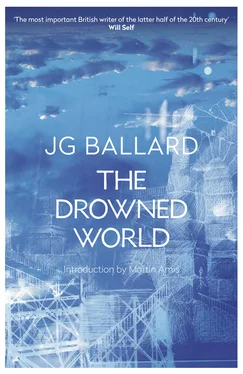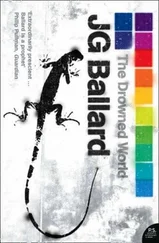The Drowned World
J. G. Ballard

Copyright Copyright Introduction by Martin Amis CHAPTER ONE: On the Beach at the Ritz CHAPTER TWO: The Coming of the Iguanas CHAPTER THREE: Towards a New Psychology CHAPTER FOUR: The Causeways of the Sun CHAPTER FIVE: Descent into Deep Time CHAPTER SIX: The Drowned Ark CHAPTER SEVEN: Carnival of Alligators CHAPTER EIGHT: The Man with the White Smile CHAPTER NINE: The Pool of Thanatos CHAPTER TEN: Surprise Party CHAPTER ELEVEN: “The Ballad of Mistah Bones” CHAPTER TWELVE: The Feast of Skulls CHAPTER THIRTEEN: Too Soon, Too Late CHAPTER FOURTEEN: Grand Slam CHAPTER FIFTEEN: The Paradises of the Sun Reality is a Stage Set Time, Memory and Inner Space Keep Reading About the Author Also by the Author About the Publisher
Fourth Estate
An imprint of HarperCollins Publishers
1 London Bridge Street
London SE1 9GF
www.harpercollins.co.uk
This edition published by Fourth Estate in 2014
First published in 1962
Copyright © J. G. Ballard 1962
J. G. Ballard asserts the moral right to be identified as the author of this work
‘The Drowned World’ © Martin Amis 2011
‘Reality Is a Stage Set’ © Travis Elborough 2006
‘Time, Memory and Inner Space’ © J. G. Ballard 1963
A catalogue record for this book is available from the British Library
This novel is entirely a work of fiction. The names, characters and incidents portrayed in it are the work of the author’s imagination. Any resemblance to actual persons, living or dead, events or localities is entirely coincidental.
All rights reserved under International and Pan-American Copyright Conventions. By payment of the required fees, you have been granted the non-exclusive, non-transferable right to access and read the text of this e-book on-screen. No part of this text may be reproduced, transmitted, downloaded, decompiled, reverse engineered, or stored in or introduced into any information storage and retrieval system, in any form or by any means, whether electronic or mechanical, now known or hereinafter invented, without the express written permission of HarperCollins e-books.
HarperCollins Publishers has made every reasonable effort to ensure that any picture content and written content in this ebook has been included or removed in accordance with the contractual and technological constrainst in operation at the time of publication.
Source ISBN: 9780007221837
Ebook Edition © OCTOBER 2014 ISBN: 9780007290123
Version: 2016-03-22
Cover Page
Title Page The Drowned World J. G. Ballard
Copyright
Introduction by Martin Amis
CHAPTER ONE: On the Beach at the Ritz
CHAPTER TWO: The Coming of the Iguanas
CHAPTER THREE: Towards a New Psychology
CHAPTER FOUR: The Causeways of the Sun
CHAPTER FIVE: Descent into Deep Time
CHAPTER SIX: The Drowned Ark
CHAPTER SEVEN: Carnival of Alligators
CHAPTER EIGHT: The Man with the White Smile
CHAPTER NINE: The Pool of Thanatos
CHAPTER TEN: Surprise Party
CHAPTER ELEVEN: “The Ballad of Mistah Bones”
CHAPTER TWELVE: The Feast of Skulls
CHAPTER THIRTEEN: Too Soon, Too Late
CHAPTER FOURTEEN: Grand Slam
CHAPTER FIFTEEN: The Paradises of the Sun
Reality is a Stage Set
Time, Memory and Inner Space
Keep Reading
About the Author
Also by the Author
About the Publisher
Introduction by Martin Amis
IS PRESCIENCE A LITERARY VIRTUE? And should the work of J. G. Ballard be particularly prized (as some critics maintain) for the ‘uncanny’ accuracy of its forecasts? The answer to both these questions, I suggest, is a cheerful no.
In The Atrocity Exhibition (1970) Ballard famously tapped Ronald Reagan for president. His Hello America (1981), on the other hand, surmised that the United States in its entirety would be evacuated by 1990. The meteorological cataclysms envisaged by his first four novels still look plausible. But the social crisis envisaged by his last four novels – violent and widespread anomie brought about by a glut of leisure and wealth – now looks vanishingly remote.
So here’s a prophecy: fictional divination will always be hopelessly haphazard. The unfolding of world-historical events is itself haphazard (and therefore unaesthetic), and ‘the future’ is in a sense defined by its messy inscrutability. Besides, the art of fiction owes allegiance to a muse, a goddess as pure as her eight sisters, and not to some bustling Madame Sosostris (Eliot’s ‘famous clairvoyant’, with her ‘wicked pack of cards’). Nevertheless there are certain writers whose visionary power is indifferent to the corroboration of mere upshots – writers who seem to be able to feel, and use, the ‘world hum’ of the ‘near-after’. That first quote is from Don DeLillo, who is one such; the second quote is from James Graham Ballard (1930–2009), who is another.
Ballard foresaw manmade climate change, not in The Drowned World (1962), but in The Drought (1964). In The Drought (originally entitled The Burning World ), industrial waste has thickened the mantle of the oceans and destroyed the precipitation cycle, transforming the planet into a wilderness of dust and fire. In The Drowned World , ecological catastrophe has a quite different set of causes. The median temperature at the Equator is 180 degrees and rising, the polar ice caps and the permafrost have melted, Europe is ‘a system of giant lagoons’, the American Midwest is ‘an enormous gulf opening into the Hudson Bay’, and the global population (down to five million) huddles within the Arctic and Antarctic Circles (where the thermometers, for now, record a ‘pleasant’ eighty-five). And how did all this come about? Solar instability, pure and simple, with no help whatever from Homo sapiens . So, on the basis of this one novel, Ballard could unobtrusively add his voice to the current Republican debate on global warming – slightly to the left of Rick Perry and Michele Bachmann, true, but slightly to the right of Mitt Romney.
This is an irony we need not fear: indeed, it speeds us on our way to more central questions. As a man (and as a good Green), Ballard was naturally on the side of the angels; but as an artist he is unconditionally of the Devil’s party. He loves the glutinous jungles of The Drowned World and the tindery deserts of The Drought – just as he loves the superhurricane, or express avalanche, of The Wind from Nowhere (1961) and the mineralised multiplicities of The Crystal World (1966). It is the measure of his creative radicalism that he welcomes these desperate dystopias with every atom of his being. When he turned away from hardcore SF in the 1950s, Ballard rejected ‘outer space’ in favour of its opposite: ‘inner space’. Accordingly, he merges with his conjured futures, internalising them in a kind of imaginative martyrdom. The fusion of mood and setting, the mapping of a landscape of the troubled mind – this is what really matters in Ballard. It gives the novels their tight clench of waywardness and fixity.
‘Soon it would be too hot’ is the laconic first sentence of The Drowned World . Its hero, the marine biologist Robert Kerans, is staring out from the balcony of his suite at the Ritz; he is the only (mammalian) occupant of the hotel; the rising water is ten storeys from his feet.
Читать дальше













